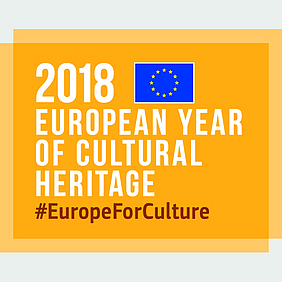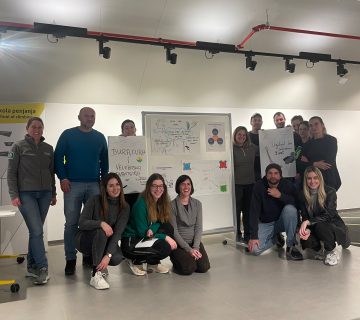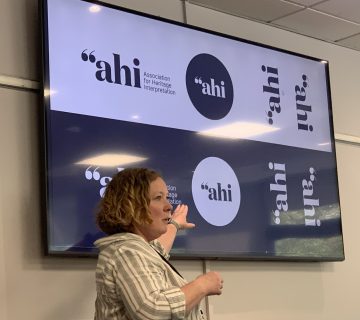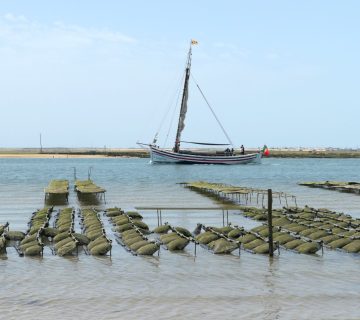On 7 December, the European Year of Cultural Heritage (EYCH) will be launched in Milan. ‘Our heritage: Where the past meets the future’ will be the slogan. 219 events from 19 European countries have already been announced.
The European Year of Cultural Heritage (EYCH) will be a joint venture of the three key EU institutions: the European Commission, the European Council and the European Parliament, as well as the Committee of the Regions and the European Economic and Social Committee. It will be supported by the Council of Europe and by global organisations such as UNESCO, ICOMOS and ICCROM. The aim of EYCH is to encourage more people to discover and explore Europe’s cultural heritage, and to reinforce a sense of belonging to the European family.
On 13 September, Jean-Claude Juncker, President of the European Commission, referred to the Year in one of the most emotional parts of his State of the Union address [https://ec.europa.eu/commission/state-union-2017_en] when he was talking about his own love for Europe. ‘Love for Europe because Europe and the European Union have achieved something unique in this fraying world: peace within and outside of Europe. Prosperity for many if not yet for all. This is something we have to remember during the European Year of Cultural Heritage. 2018 must be a celebration of cultural diversity.’
The European Commission is calling for initiatives in ten fields within four subject areas:
Engagement
- Shared heritage: Cultural heritage belongs to us all
- Heritage at school: Children discovering Europe’s most precious treasures and traditions
- Youth for heritage: Young people bringing new life to heritage
Sustainability
- Heritage in transition: Re-imagining industrial, religious, military sites and landscapes
- Tourism and heritage: Responsible and sustainable tourism around cultural heritage
Protection
- Cherishing heritage: Developing quality standards for interventions on cultural heritage
- Heritage at risk: Fighting against illicit trade in cultural goods and managing risks for cultural heritage
Innovation
- Heritage-related skills: Better education and training for traditional and new professions
- All for heritage: Fostering social innovation and people’s and communities’ participation
- Science for heritage: Research, innovation, science and technology for the benefit of heritage
As one of the first contributions of the Year, IE ran a workshop for the Task Force of the European Commission and underlined the significance of our shared European values in the 50-page paper, ‘Engaging citizens with Europe’s cultural heritage: How to make best use of the interpretive approach’ (see www.interpret-europe.net/material). This paper addressed the first EYCH subject area has been sent by the Commission to about 70 EYCH National Coordinators and Members of the EYCH Stakeholder Committee. Our main contribution will be our IE Conference 2018, which will be dedicated to ‘Heritage and Identity’ as one of the most critical subjects for Europe. We are also preparing for joint activities with other European stakeholder organisations.
Just recently, the second preparation meeting for EYCH took place in Brussels where the communication design was revealed. The official hashtag will be #EuropeforCulture and the EYCH website will be online from the third preparation meeting in December. Until then, information can be found on
https://ec.europa.eu/culture/european-year-cultural-heritage-2018_en.
Representatives of ten EU Directorates General (the ‘ministries’ within the European Commission) announced that they will open special opportunities for EYCH projects within their funding schemes. Many projects will be funded with the support of Creative Europe, Horizon 2020, Erasmus+, Citizens for Europe, and other EU funding programmes. However, an additional EYCH call for proposals within the Creative Europe Programme [https://eacea.ec.europa.eu/creative-europe/funding/support-european-cooperation-projects-2018_en] has just been issued and will remain open until 22 November 2017.
Besides this, most European countries have set up their own national budgets to support EYCH. Below, you can find a list of all EYCH national coordinators who have been appointed so far; please get in touch with them if you would like to run projects related to EYCH on a national level or to take the opportunity to go for cross-border projects together with members from neighbouring countries.
It is very pleasing to see how all these wheels now mesh with each other and start spinning. Please be assured that we will keep all members updated on all critical information we receive within the next few months.
President Juncker said: ‘For me, Europe is more than just a single market. More than money, more than the euro. It was always about values.’ Triggering thinking about values is at the heart of the interpretive profession. The European Year of Cultural Heritage will give us the opportunity to convince others of the advantages heritage interpretation has to offer for our shared European future.
EYCH National Coordinators
Austria
Anna Steiner (anna.steiner@bka.gv.at)
Head of International Cultural Affairs, Department for European and International Cultural Policy, Federal Chancellery
Belgium (Brussels)
Thierry Wauters (twauters@sprb.brussels)
Director for Monuments and Sites, Bruxelles Urbanisme et Patrimoine, Brussels’ Regional Public Service
Belgium (Flanders)
Brigitte Myle (brigitte.myle@cjsm.vlaanderen.be)
Head Flanders Collection Team, Department of Culture, Youth and Media
Belgium (German)
Melanie Wirtz (melanie.wirtz@dgov.be)
Secretary for Culture and Intangible Cultural Heritage, Ministry of the German-speaking Community
Belgium (Wallonia)
Emilie Tondreau (emilie.tondreau@cfwb.be)
Attachee, General Administration for Culture, Strategic Direction – International Relations Service
Bulgaria
Peter Miladinov (p.miladinov@mc.government.bg)
State Expert, Ministry of Culture
Croatia
Anuska Deranja Crnokic (anuska.deranja-crnokic@min-kulture.hr)
Head of Service for Cultural Heritage Documentation, Registry and Promotion, Directorate for the Protection of Cultural Heritage, Ministry of Culture
Cyprus
Marina Solomonidou-Ieronymidou (antiquitiesdept@da.mcw.gov.cy)
Director, Department of Antiquities, Ministry of Transportation, Communications and Works
Pavlos Paraskevas (pparaskevas@culture.moec.gov.cy)
Director of the Cultural Services, Ministry of Education and Culture
Czech Republic
Magdalena Fantova (magdalena.fantova@mkcr.cz)
European Affairs, Ministry of Culture
Denmark
Bolette Lehn Petersen (blp@slks.dk)
Special Adviser, Agency for Culture and Palaces
Estonia
Carolin Pihlap (carolin.pihlap@muinas.ee)
Deputy Director-General for Development, National Heritage Board
Finland
Ulla Salmela (ulla.salmela@museovirasto.fi)
Chief Intendant, National Board of Antiquities, Cultural Environment Sciences
France
Bruno Favel (bruno.favel@culture.gouv.fr)
Head of the Department of European and International Affairs, Directorate General for Heritage, Ministry of Culture and Communication
Germany
Uwe Koch (Uwe.Koch@bkm.bund.de)
Chairman, National Committees for Monument Protection (DNK)
Philipp Holzheid (philipp.holzheid@stk.bayern.de)
Representative of the German Federal States in the Cultural Affairs Committee of the EU Council
Juliane Thümmel (juliane.thuemmel@diplo.de)
Representative of BKM at StäV/Brüssel
Greece
Dimitrios Athanasoulis (dathanasoulis@gmail.com)
Head of the Ephorate of Antiquities of Cyclades, Hellenic Ministry of Culture and Sports
Hungary
Anna Vágási-Kovács (anna.vagasi-kovacs@me.gov.hu)
Head of Unit for International and World Heritage Affairs, State Secretariat for Cultural Heritage Protection
Zsusanna Benjone Kiss (zsuzsa.kiss@emmi.gov.hu)
Head of Department, Ministry of Human Capacities
Ireland
Beatrice Kelly (bkelly@heritagecouncil.ie)
Head of Policy & Research, Heritage Council of Ireland
Italy
Giuliana de Francesco (giuliana.defrancesco@beniculturali.it)
Head of Unit European Relations, Secretariat General of the Ministry of Cultural Heritage, Cultural Activities and Tourism
Latvia
Janis Asaris (janis.asaris@mantojums.lv)
State Inspection for Heritage Protection
Lithuania
Alfredas Jomantas (a.jomantas@heritage.lt)
Head of Division for the Public Relations, Education and Register of Cultural Heritage, Department of Cultural Heritage, Ministry of Culture
Luxembourg
Beryl Bruck (beryl.bruck@mc.etat.lu)
Adviser, Ministry of Culture
Malta
Catherine Tabone (catherine.tabone@gov.mt)
Director of Culture Directorate, Ministry of Justice, Culture and Local Government
Netherlands
Flora van Regteren Altena (f.altena@minocw.nl)
Senior Policy Adviser, Department of Cultural Heritage, Ministry of Education, Culture and Science
Poland
Agata Waskowska-Pawlik (sekretariat@mck.krakow.pl)
Deputy Director, International Culture Centre
Portugal
Guilherme d’Oliveira (gom@cnc.pt)
President, National Centre of Culture
Romania
Ioana Irina Iamandescu (irina.iamandescu@patrimoniu.gov.ro)
Director for Immovable Heritage, National Institute of Heritage (NIH)
Slovakia
Zuzana Ondrejkova (zuzana.ondrejkova@culture.gov.sk)
Director of the Department for the Protection of Monuments and Historic Sites in the Cultural Heritage Section, Ministry of Culture
Slovenia
Maja Dimitrovski (maja.dimitrovski@gov.si)
Head of Minister’s Cabinet
Sweden
Anita Bergensträhle-Lind (anita.bergenstrahle-lind@raa.se)
Head of International Policy and Cooperation, Office of the Director General, Swedish National Board of Heritage
United Kingdom
Silke Pillinger (silke.pillinger@britishcouncil.org)
Director of Arts EU, British Council
To cite this article:
Ludwig, Thorsten (2017) ‘EYCH: Time to get ready!’. In Interpret Europe Newsletter 3-2017, 4-7.




